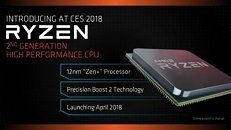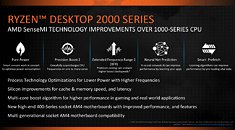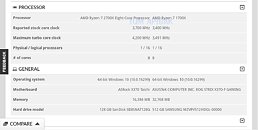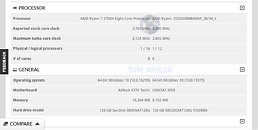Friday, March 2nd 2018

AMD Ryzen 7 2700X Spotted With a 3.7 GHz Base Clock, 4.1 GHz Turbo
AMD's next iteration on their very positively received Zen microarchitecture is preparing for take-off in the coming months, and as we draw ever close to the release date, more details are trickling in. This time, it's the appearance of a Ryzen 7 2700X (which supersedes the original Ryzen 7 1700X) on Futuremark's 3DMark database. The Ryzen 7 2700X was paired with an ASRock X370 Taichi motherboard (still considered one of the best ever to grace AMD's new AM4 platform), and its 8 cores and 16 threads are locked into a 3.7 GHz base and 4.1 GHz turbo clocks (respectively 300 MHz higher base and turbo clocks that the 1700X's).
The usage of AMD's XFR 2.0 (eXtended Frequency Range) and Precision Boost 2.0 could mean that the CPU is able, in certain scenarios, to turbo over the specified limit of 4.1 GHz, up to 4.2 GHz, thus delivering an even bigger boost to its performance. The usage of a 12 nm process means AMD has taken the power savings and increased frequency potential that comes from shrinking their original Zen microarchitecture, and put those to increased frequencies across the board, thus increasing their CPU's single-thread performance. Being an X chip,. AMD has kept the package TDP at a still respectable 95 W, much like its 1000 series Ryzens, though we know that this 95 W figure doesn't really spell out just how energy efficient these AMD CPUs really are.
Sources:
ComputerBase, WCCFTech
The usage of AMD's XFR 2.0 (eXtended Frequency Range) and Precision Boost 2.0 could mean that the CPU is able, in certain scenarios, to turbo over the specified limit of 4.1 GHz, up to 4.2 GHz, thus delivering an even bigger boost to its performance. The usage of a 12 nm process means AMD has taken the power savings and increased frequency potential that comes from shrinking their original Zen microarchitecture, and put those to increased frequencies across the board, thus increasing their CPU's single-thread performance. Being an X chip,. AMD has kept the package TDP at a still respectable 95 W, much like its 1000 series Ryzens, though we know that this 95 W figure doesn't really spell out just how energy efficient these AMD CPUs really are.




71 Comments on AMD Ryzen 7 2700X Spotted With a 3.7 GHz Base Clock, 4.1 GHz Turbo
That would be quite good :)
Interesting to see if the 2800X is the same incrementally above as the 1800X was (hypothetically to 3.9Ghz base and 4.3Ghz boost).
We'll know soon enough.
www.purepc.pl/procesory/test_procesora_intel_core_i7_8700k_premiera_coffee_lake?page=0,31
www.purepc.pl/procesory/test_procesora_intel_core_i7_8700k_premiera_coffee_lake?page=0,32
www.purepc.pl/procesory/test_procesora_intel_core_i7_8700k_premiera_coffee_lake?page=0,33
www.purepc.pl/procesory/test_procesora_intel_core_i7_8700k_premiera_coffee_lake?page=0,34
www.purepc.pl/procesory/test_procesora_intel_core_i7_8700k_premiera_coffee_lake?page=0,35
www.purepc.pl/procesory/test_procesora_intel_core_i7_8700k_premiera_coffee_lake?page=0,36
www.purepc.pl/procesory/test_procesora_intel_core_i7_8700k_premiera_coffee_lake?page=0,37
www.purepc.pl/procesory/test_procesora_intel_core_i7_8700k_premiera_coffee_lake?page=0,38
www.purepc.pl/procesory/test_procesora_intel_core_i7_8700k_premiera_coffee_lake?page=0,39
www.purepc.pl/procesory/test_procesora_intel_core_i7_8700k_premiera_coffee_lake?page=0,40
Had those 6 core Coffee Lake chips been out at the same time and same price - would I have bought Ryzen? - Hell, no. But I did, so do i see these new chips as a great thing? If I can get 4GHz+ on 8 cores - absolutely. Pricing will make them great or mediocre though.
Though,frankly,I saw my 4790K bottleneck my 1080 at 1440p in some cpu heavy games like watch dogs 2 so 1080p testing is not just for those who play at 1080p, it's good for determining cpu -heavy scenario. If you're as heavily cpu bottlenecked at 1080p as ryzen seem to be there is no guarantee you won't be bottlenecked 1440p, chances are you'll find a slight to moderate cpu bottleneck as well, upping the resolution can't solve everything.
Just going by the fact that games can utilize 16 threads does not automatically translate to "having more threads can fully compensate for weaker ipc". This is absolutely a case of false equivalency. IPC is still #1 performance factor as long as the cpu has enough threads available not to exceed 80-85% on each.
Though it has to be said that a 4.1GHz Ryzen will stroll past 8700K in any video-creation software pretty easily. For gaming though, it's still not nearly as high as I'd like to see it.
Overall we get 300 more MHz, which is less than 8% faster than the previous generation. Faster, for sure, but you'd be hard pressed to notice the difference outside benchmarks. Whoever bought first gen Ryzen is still good.
I suppose I must be doing some kind of sorcery because ryzen can't manage high fps...
Everytime I read ryzen is bad for gaming I laugh hard.
Sure a 8700k would give me more fps, but thinking that ryzen is not valid for gaming is having literally no clue about how good they are. Not the top of course, but sure is not limited for 60hz gaming, even on 1080. I guarantee that
If you want/need the absolute highest fps, Intel will oblige (it will also oblige for several other applications that don't use many cores at once). But nowhere have I read Ryzen was bad for gaming.
If 1080p is supposed to be the worst scenario for gaming on ryzen and I play personally over 120 framerates at that resolution, I cannot see how this cpu is not good for gaming. Just saying.
Not to mention what a beast is this chip in other stuff.
But yeah when you're over 120fps, having a little more makes the usual comparation night and day between both manufacturers.
The impression you get reading some places is ryzen should be avoided if you want mora than 60fps, and that's absolutely lie.